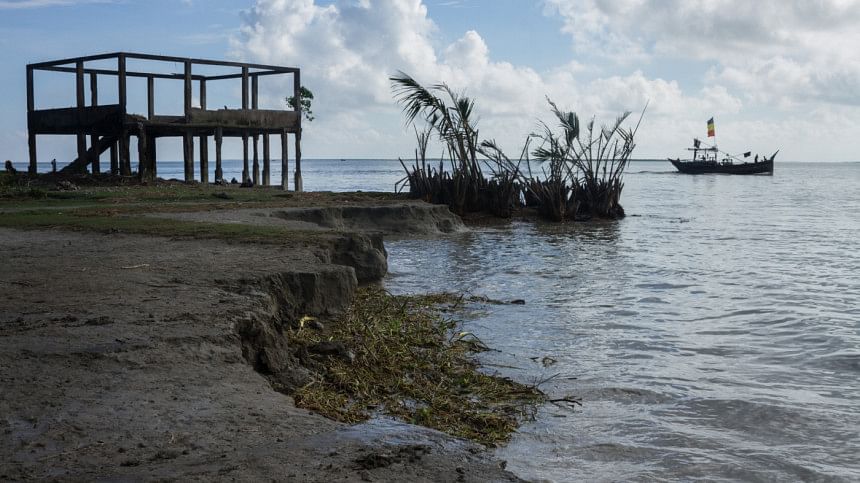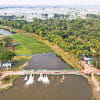As climate change intensifies, Bangladesh faces heightened vulnerability due to its tropical environment, geographic location, and the unchecked pressures of a capitalistic economy. According to the International Organization for Migration (IOM), by 2050, almost a million people may be displaced in southern Bangladesh due to rising sea levels. Record-breaking heat waves and frequent flash floods continuously occur as a premonition of the impending disaster. Consequently, every sector of Bangladesh and its people's lives are being hampered due to the climate catastrophe. Education is one such sector that is struggling to cope with climate change.
In August this year, parts of the country were devastated by floods; Sylhet was one such region. As was to be expected, this had a detrimental impact on students as commuting to school became almost impossible and classes were suspended.

Md Zawad Nafi, a student from Murari Chand College, Sylhet, recounts the difficulties he faced while attending classes during the floods, "During the floods, our college remained open, but due to low attendance, classes were unofficially suspended. It was very difficult for students to commute to and from their colleges during this time as – because of the heavy rainfall – most of the roads went underwater."
The floods had a more severe impact on students who were supposed to sit for their public examinations, such as the HSC examinations. Nafila Firuz, a recent HSC graduate from Chhatak Degree Government College, Sunamganj, was one of the many HSC candidates whose exams were halted during the floods.
"It was a very stressful situation for me and other HSC candidates because we could neither study properly nor attend the exams due to the flood," says Nafila. "Everyone had to use boats to commute from one place to another. Also, everyone was worried since we weren't sure whether or not the exams were going to take place. On top of all that, there were a lot of fake news stories circulating on social media regarding our exam schedule and its postponement. Because of the floods, we also had to deal with power outages and internet issues. I was panicking and constantly thought about what would happen if the exams took place and I failed to participate."
Apart from the exam stress, Nafila was also worried about her home and family. "Everyone had to leave their homes and take shelter somewhere else; it was very hectic," she recalls.

It goes without saying that these climate change-induced natural disasters in Bangladesh are creating unsafe environments for the country's students. What's even more unfortunate is that the condition gets worse when the victims are socially marginalised.
Articulating the severity of the impact of such disasters, Ekhtekharul Islam, a senior lecturer at the Department of Environmental Science and Management, Independent University, Bangladesh (IUB), says, "The recent floods in Feni and Cumilla have left many already-dilapidated schools completely unusable for an extended period, even after the floodwaters receded. The flash flood in Sherpur came without any early warning and forced many students to discontinue their studies as the primary focus of their families was on recovery. The record-breaking flood in the Sylhet region in 2022 had submerged hundreds of education institutions, leaving them closed for weeks."
While climate change impacts every single person including students, female students disproportionately bear its wrath. French philosopher and writer Simone de Beauvoir, in her seminal book The Second Sex, theorises that in society, females are the "other" and males are considered the "default". That means women are treated as mere extensions of men instead of having their independent identity or purpose. This is specifically true in a stringently patriarchal society like Bangladesh. In the face of natural disasters, it is girls' education that gets disproportionately impacted.

As Laila Khondokar, an international development worker, points out, "Bangladesh is highly vulnerable to climate shocks, which disproportionately impact girls' ability to go to school, especially in vulnerable geographic areas like char, haor, and coastal areas where climate events pose the greatest threat. Floods, tropical cyclones, storm surges, and droughts are likely to become more frequent and severe in the coming years due to climate change. Patterns of natural disaster have also changed, increasing uncertainties for parents and making girls more vulnerable."
Regarding girls' education, Ekhtakarul recounts the experience of a low-income family that he came across where the daughter's education was deprioritised. He recalls, "I met a father who migrated to Dhaka with his son and wife after the destruction of his grocery shop in the 2022 floods in Sylhet. However, they left their nine-year-old daughter behind with her grandmother as the rest of them decided to work and repay the loans they had. The girl stopped going to school. It can be anticipated that her life will be dramatically affected due to the flood. According to a recent study I came across, 86 percent of young girls who continued their education after natural disasters experienced an increased workload, reducing their time for studies."

Given the impact climate change is having on Bangladeshi students, it would not be an exaggeration to say that it is posing a great threat to the educational progress of this country by plucking its students out of the classroom and deteriorating their educational environment. For this reason, the Bangladeshi government, as well as global leaders, must act with urgency to mitigate this climate crisis.
"There is a need to develop and implement flexible, accessible, inclusive, and gender-responsive distance learning programmes that can be scaled up rapidly in the event of future school closures to prevent disruptions to learning," suggests Laila.
Ekhtekharul adds to this, suggesting that the government should empower locals through community mapping. He says, "Policymakers can incorporate community risk mapping as part of climate adaptation efforts to specifically identify and address risks faced by school-going children. By integrating gender-sensitive risk mapping, policymakers can better identify the specific vulnerabilities girls face, which include early marriage, trafficking, and dropout in post-disaster scenarios."
Along with that, Ekhtekharul also suggests that educational institutions should help students develop climate action clubs. According to him, establishing such clubs would make students more knowledgeable and self-equipped in the face of natural disasters.
"These clubs could raise awareness about climate change, develop leadership qualities among students, and have them engage in undertaking precautionary measures. Involving students in climate action also ensures they are more equipped to handle the psychological and academic challenges posed by disasters," he explains.

Nonetheless, to implement a climate-friendly infrastructure, different factions of the government have to take decisive action. Along with that, mutual trust between locals and government officials has to be established. Only a collaborative effort from all sections can mitigate the traumatic impact of climate change on students.
References:
1. The Daily Star (February 12, 2024). Rising Sea Levels: 9 lakh in south may be displaced by 2050.
2. The Daily Star (February 29, 2024). Climate change is fuelling child marriage in Bangladesh.
Fariha Lamisa is majoring in English at East West University. You can reach her at [email protected].





Comments